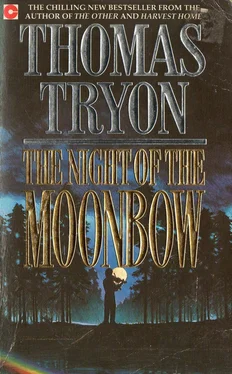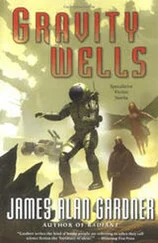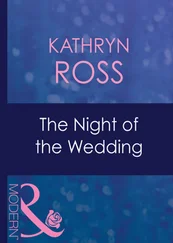Thomas Tryon - The Night of the Moonbow
Здесь есть возможность читать онлайн «Thomas Tryon - The Night of the Moonbow» весь текст электронной книги совершенно бесплатно (целиком полную версию без сокращений). В некоторых случаях можно слушать аудио, скачать через торрент в формате fb2 и присутствует краткое содержание. Жанр: Триллер, на английском языке. Описание произведения, (предисловие) а так же отзывы посетителей доступны на портале библиотеки ЛибКат.
- Название:The Night of the Moonbow
- Автор:
- Жанр:
- Год:неизвестен
- ISBN:нет данных
- Рейтинг книги:3 / 5. Голосов: 1
-
Избранное:Добавить в избранное
- Отзывы:
-
Ваша оценка:
- 60
- 1
- 2
- 3
- 4
- 5
The Night of the Moonbow: краткое содержание, описание и аннотация
Предлагаем к чтению аннотацию, описание, краткое содержание или предисловие (зависит от того, что написал сам автор книги «The Night of the Moonbow»). Если вы не нашли необходимую информацию о книге — напишите в комментариях, мы постараемся отыскать её.
The Night of the Moonbow — читать онлайн бесплатно полную книгу (весь текст) целиком
Ниже представлен текст книги, разбитый по страницам. Система сохранения места последней прочитанной страницы, позволяет с удобством читать онлайн бесплатно книгу «The Night of the Moonbow», без необходимости каждый раз заново искать на чём Вы остановились. Поставьте закладку, и сможете в любой момент перейти на страницу, на которой закончили чтение.
Интервал:
Закладка:
“Sure, why not?” Rolfe replied. “It’s the truth, isn’t it?” Then he gave Andy a friendly clap between the shoulders and sent him off with his partner to write up his story.
Movie night always drew an enthusiastic crowd, and that night the boys seemed in uncommonly boisterous spirits, as shortly before eight they came trooping into the lodge and took their places. The movie projector rested on a card table in front of the model, which had been left in the center of the room to be ready for the dedication ceremony, but the older boys ranged their seats around it without much difficulty, so that no one’s view was obscured. Big Rolfe’s friend at the film exchange had selected The Phantom of the Opera, the Lon Chaney silent hit, and as the last stragglers appeared the audience began to chant, clap, and stamp their feet and otherwise demonstrate their eagerness to be scared out of ten years’ growth by an actor whose fame rested on precisely that, a singular ability to terrify audiences in movie houses across the country, where fainting and horror-stricken females had to be carried on stretchers into the lobby and revived with ammoniac ampules and carted off in waiting ambulances.
There was a hitch in the proceedings – no one knew why, until Oats Gurley, whose duty it was to operate the movie projector, said they couldn’t start until Reece put in an appearance with the film cans. A mixture of cheers and jeers sounded in the room. Then the boys began to chant: “We want Heartless, we want Heartless…”
At last the courier arrived – at which the room erupted into louder huzzahs. After he had exhibited the cans of film and made mock bows to all sides, he slipped in among “his boys,” and the reels began to turn.
Alas, anticipation soon turned to disappointment. Lon Chaney had gone to the Great Movie Show in the Sky, had in fact died eight years before, and his silent movie had a decidedly creaky look. In fact, the term “the flickers” had been coined to describe films such as this one; old and scratched, the reels had undoubtedly run through the sprockets of untold projectors over the years, and the titles leaped and danced about on the screen. Catcalls and whistles, groans and jokes greeted the coloratura singing her heart out on the stage of the Paris Opera House and the corny notes written by the “Phantom” threatening the end of her career, nay, her life, if she presumed to appear onstage instead of his beloved Christine. There followed a higher-scoring scene in which, while the heroine dares her fate, the giant crystal chandelier at the top of the opera-house ceiling is made by some sinister hand (Yikes! The Phantom!) to come crashing down into the orchestra, crushing to death those spectators unlucky enough to be sitting beneath the fixture. And then, finally, the electrifying moment when “Erik,” the Phantom, first appears, his features hidden by a mask. With his long, slender, and enticing hand he lures Christine down, down, many floors below, under the opera house, where there exists a sullen black lagoon and, anchored at a stone mooring step, a slender, coffin-like vessel. Upon this slender vessel the lady is persuaded to embark for the Phantom’s subterranean apartments, where she is safely, and presumably contentedly, installed, seemingly only a little intimidated by her bizarre surroundings and the Phantom’s eternally masked presence. Later, unable to control her curiosity, as he plays the organ she slips up behind the unsuspecting Phantom and tears away his mask. Oh, horror! His features bared, he turns upon her and shows her that nightmare face, skull-like and awful to look upon with grinning teeth and two holes where a nose ought to have been.
Ha ha!
The Phantom scornfully mocks Christine and her irrepressible curiosity, then moves menacingly toward her. Unable to tear his eyes from the screen, Leo watches with mounting horror. For him the movie is too real; it scares him. Heedless of where he is, he leaps to his feet with a shout, which rings out and reverberates against the ceiling.
No sooner had the sound burst from him than a wave of mocking laughter shook the room, and “Wacko, Wacko, Wacko,” the epithet ran along the rows. “Scaredy-cat, scaredy-cat.” Flashlights were switched on, their probing beams sought him out, illuminating his dazed features. Ducking his head, he stumbled up the aisle and rushed outside; the door clattered loudly at his back, producing another volley of laughter. Hot with shame and embarrassment, he rushed down the steps and made his way blindly along the first path he came to. It was dark and he had trouble finding his way. To his left he could hear the lake water lapping the shore, and he pushed on until he came out at Three Corner Cove. No lights were on at the infirmary, nor at the Oliphants’ cottage, yet he judged someone to be home, because the car was pulled up on the grass. He trudged to the end of the dock and sat down, dangling his legs and listening to the sound of the water against the pilings. What a fool he was to act that way. When would he ever learn?
“Leo?”
He turned around to find Fritz and Wanda, who had stolen up behind him.
“Mind if we join you?” Fritz asked. No reply; but Leo was glad all the same for the company.
“You all right?” Wanda asked.
“Yes.”
“It’s nice here,” she said, “but I’ll bet it’d be nicer inside. I think if we looked in the icebox we’d find some ice cream. How does that sound?”
Leo was appreciative; neither had asked about his exhibition in the iodge; now here was Wanda inviting him in for ice cream, a thing camp rules strictly forbade her to do.
She gave Leo a hand up and they left the dock for the infirmary, where Wanda turned on lights and went inside. Leo and Fritz waited on the porch until she reappeared with a tray of ice cream and cookies. Then Fritz got up to tune in Wayne King and the Lady Esther Orchestra, and soon they had a little party going and, despite his embarrassment, Leo was enjoying himself.
His enjoyment was short-lived, however; another flashlight beam broke the surrounding dark, and Reece appeared. Leo tensed as the counselor marched up the steps and surveyed the scene.
“Well, this is chummy. Somebody’s birthday?”
“We were just having a taste of ice cream,” Wanda said lightly. “Sorry, there’s none left.”
Reece scowled at Leo. “I figured this is where I’d find you. What’s the idea, running out like a crazy man?” Without waiting for an answer, he leaned over to take Leo’s dish.
“Oh, let him finish,” Wanda protested. “Stop picking on him all the time.”
Reece swung on her angrily. “When are you two going to stop coddling this spud?”
Wanda tipped the ash from her cigarette into the nasturtiums below the railing. “Nobody’s coddling him,” she returned evenly. “Leo really doesn’t deserve the kind of treatment he’s been getting around here.”
“Look, like I told you once before, he’s not your camper, he’s my camper,” Reece retorted. “I’m the counselor of Jeremiah, and as long as he sleeps in my cabin he belongs to me. I’ll decide what to do with him, not you.”
“I’m only trying to help. He’s got to have someone he can turn to in this place.”
“And that someone is you, hm? The way you spoil him, he’ll never get anywhere. You’re like a mother hen.” “Then I’m glad – since he hasn’t got a mother.”
Reece’s voice sharpened. “Lots of people don’t have mothers and they get along just fine. So take my advice and steer clear of him”
Fritz snorted. “And you are going to make me, I suppose, with your Mingoes and your foolish posters.”
Reece lounged negligently on the railing, his expression lightly mocking, as if he found Fritz a figure of amusement. “You just don’t get the picture, do you, Fritzy.”
Читать дальшеИнтервал:
Закладка:
Похожие книги на «The Night of the Moonbow»
Представляем Вашему вниманию похожие книги на «The Night of the Moonbow» списком для выбора. Мы отобрали схожую по названию и смыслу литературу в надежде предоставить читателям больше вариантов отыскать новые, интересные, ещё непрочитанные произведения.
Обсуждение, отзывы о книге «The Night of the Moonbow» и просто собственные мнения читателей. Оставьте ваши комментарии, напишите, что Вы думаете о произведении, его смысле или главных героях. Укажите что конкретно понравилось, а что нет, и почему Вы так считаете.












